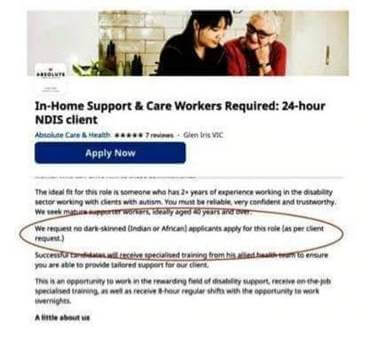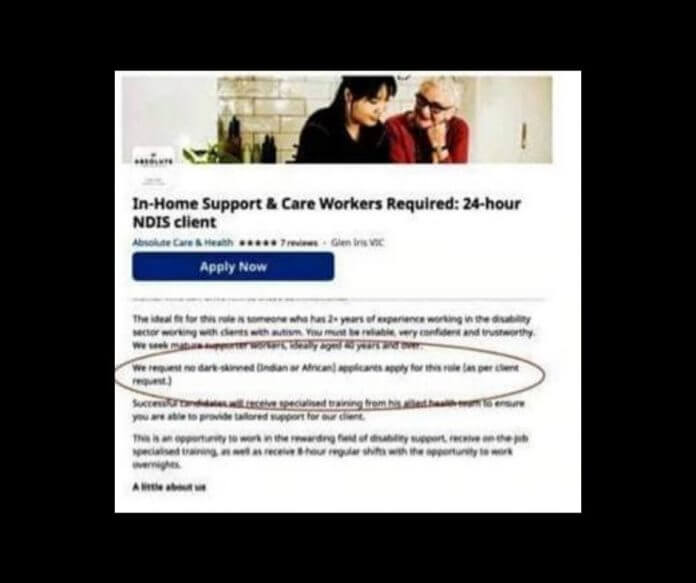Yesterday, 7 News reported about the disability care provider from Melbourne who had requested for “no dark-skinned” applicants. It said the ad was removed soon after it was posted and launched an investigation into how it was allowed to be made. The ad has been condemned as “stomach-churning” by the Chairman of the Anti-Defamation Commission Dr Dvir Abramovich.

The company in their advert stated, “We request no dark-skinned (Indian or African) applicants apply for this role.” It said the request was made because of a “client request”. There has been much backlash against the advertisement, but I beg to differ. I think they did the right thing, and more organisations should follow and say it like it is.
You see, they’ve actually done a favour to ‘people of colour’ (POC) by telling them up front that this job is not for them. The advert saved POC the time and effort invested in preparing an application, only to be rewarded with deafening silence in return. Or at best becoming a tokenistic POC candidate on the shortlist, and then receiving that standard reply: “the calibre of other candidates was very high…” with no additional meaningful feedback.
As an HR professional and a Diversity and Inclusion specialist, I often meet or hear from people who have put their heart and soul into a job application. I find them to be talented, educated, and hardworking applicants. Some of them may have moved here to gain a tertiary education, but many are born and/or raised here who still encounter that question – “where are you really from?”
I’ve heard from a friend (who had a decade-long experience as a recruiter and came here to further her education) who was told that she did not make the cut because ‘the team feels you would not be attending evening drinks with them as you seem different.’
Another was told by a recruiter that her name sounded ‘too Indian’ and that had put off a prospective employer.
There’s even a name for this that sounds less offensive: Culture fit.
When I was younger and naïve, this would upset me no end. On one occasion I shot back, “Are you looking for ‘culture fit’ or ‘colour fit’?”
Of course, it’s not just about colour. It’s just as much about gender, about age, sexual orientation, how you dress, or even your post code.
Whatever your bias, just spell it out.
We now celebrate an annual Harmony Day (thanks for the samosas and the spanakopitas), and terms like “Diversity” and “Inclusion” are bandied about like nobody’s business, but positive changes are happening at a glacial pace. There is minimal integration at the mid and lower levels of management, and next to none at senior levels (tokenism at best). A previous boss referred to his executive team as his little United Nations, after he hired two new managers – me, and another person of Chinese heritage.
Meanwhile, there is a growing body of evidence suggesting that diversity has a significant impact on the bottom line; organisations with diverse management teams are more innovative and typically show 19% more revenue than those that do not. Yet 97% of Chief Executives and equivalents for top Australian organisations are from Anglo-Celtic and European background.
It’s common for today’s POC professionals, who grew up outside their own culture, to have made peace with the fact that 7 times out of 10, their application will not be picked up, or at an interview they will be told your English is ‘really good’.
It’s the new generation that I’m worried about – those who were born in Australia. I see so many, who keep changing their field of study, thinking that perhaps with this new degree I will secure a good role, but that never happens.
These kids don’t have a dual identity; they see themselves as Australians first, but does the rest of Australia?
How about we do the youth of this country a favour so they don’t get their aspirations lost in the embedded systemic racism of corporate Australia, or have their ambitions crushed under the weight of your biases.
In your next job advert, write it as it is, and stop wasting their time, unless you are really ready to give them a fair go.
READ ALSO: Propelling the migrant community back into the workforce





